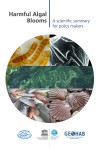The Ocean and Climate Change
cop21-climate-change-ocean.jpg

The importance of the ocean to global climate cannot be underestimated. Ocean absorbs a significant part of carbon and an overwhelming portion of the excess heat. Also, the ocean is the largest and one of the most important life support systems on this planet. However, warmer atmosphere and increasing concentration of greenhouse gases, pollution from land, overfishing, unsustainable coastal development and population activities, all exert an enormous pressure on the world’s ocean, its coasts and marine ecosystems.
The Intergovernmental Oceanographic Commission (IOC) of UNESCO facilitates the development of ocean sciences, observations and capacity-building to monitor the ocean’s major role in the climate system and predict ocean changes. It lays the ground for the design of efficient climate adaptation and mitigation strategies. IOC focuses on the most damaging impacts, such as ocean acidification and temperature increase, resulting in coral bleaching, sea-level rise, deoxygenation, variations in storminess and changes in marine biodiversity.
The scientifically-founded services promoted by IOC-UNESCO help Member States to become more resilient to present and future climate impacts. Partnerships are key in this respect. IOC-UNESCO was instrumental in launching the Ocean and Climate Platform that now unites more than 50 ocean stakeholders of different nature and helps the oceanographic community to inform COP21-related debates on the vital interaction between climate and ocean. Indeed, climate change also means ocean change. Climate negotiations addressing both adaptation and mitigation should not overlook ocean-related solutions. In this context, IOC-UNESCO is at the forefront of formulation of new research priorities linked to climate change impacts on the ocean, climate change mitigation through the conservation and restoration of coastal and marine ecosystems such as mangroves and salt marshes – the so-called ‘blue carbon’ – and overall contribution of the ocean to sustainable development through the transition to a ‘blue economy’.






